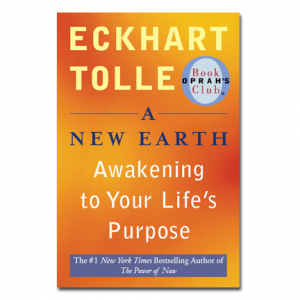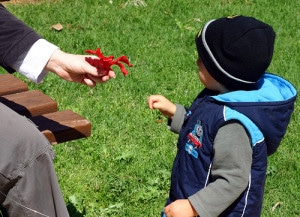Eckhart Tolle begins chapter four “Role-playing: the many faces of the ego” by discussing the roles that people play. Tolle points out that most people are unaware of the roles that they are playing in life in order to have their needs met. Any conceptual sense of the self is ego. That can be either positive or negative. Most people move between feeling inferior and superior to others depending on who they come into contact with in the situation.
Villian, victim, lover
When the ego cannot get the attention that it desires it will often try again negative attention instead. Children often do this by misbehaving. As adults the ego sometimes commit crimes in order to avoid feeling insignificant. Another common behaviour is playing the role of the victim in order to elicit sympathy. Even falling in love is usually a desire for the person to fulfill your needs. When reality sets in that the person is able to remove the underlying sense of fear and lack that is part of an egoic sense of self the relationship runs into trouble.
Letting go of self definitions
Tolle explains that in tribal cultures people were given certain functions. These functions could be farmer, priest, ruler, warrior or some other class description. In the modern world our roles are less clearly defined and people are more confused about how they fit and their purpose. Tolle suggests that feeling confused about one’s identity is actually useful. He states that we should stop looking to thought in order to define our identity.
Pre-established roles
Our talents as human beings differ significantly. The important thing is avoiding having the function that you perform take over your life. When you recognise that you are playing a role you’re taking the first step to becoming free from. Tolle points out that the “hippie movement” of the 1960s involved young people rejecting the archetypal roles that society had prescribed for them. Much of this was to do with the rejection of the Vietnam War which would lead to 57,000 Americans being killed. This is illustrated to young people the dangers of taking up the roles that their parents and society defined.
Temporary roles

In addition to our permanent roles we also played temporary roles throughout our day-to-day life. The way that we interact with the janitor is different to the way that we would talk to our boss. When we enter a restaurant or a shop we take on a certain role in terms of the way that we act. Because we are identifying people in terms of the roles that we identify with them the relationship between us and the other person is authentic.
The monk with sweaty palms
Tolle tells the story of a Zen monk called Kasan who it been put in charge of the funeral of a nobleman. As he was waiting for the governor he noticed that as palms were sweating. The following day he gathered his disciples and told them that it was not yet ready to be a true teacher. He realised that he could not approach all humans no matter their status as being the same. As a result he left to become the pupil of another master and did not return until eight years later when he gained enlightenment.
Happiness as a role versus true happiness
Tolle points out that happiness is often a role that people play. Behind the smiles often lies depression and heartache. Tolle explains that unhappiness is not because of the situation but your thoughts about it. By being aware you are able to see the links between your thinking and your emotions.
Parenthood: role or function?
Most people at some point will become a parent. But the way that we act as a parent is often by playing a role. They don’t treat the child as being an equal. Tolle asks whether a person is able to perform the functions of being a parent without it becoming a role. These functions include looking after the welfare and looking after their needs. At times it means telling them what to do and what not to do. But it is easy for this function to become exaggerated and to become too controlling.
Conscious suffering
The more that you believe that you know what’s best for your child and how their life should develop the less present you are for them. Children need to be allowed to make their own mistakes and at times this means that you will have to allow them to suffer the consequences. The ego believes that it shouldn’t have to suffer. Unfortunately this thought makes and suffer even more. When you say yes to suffering you’re able to take the first kept transcending it.
Conscious parenting

Conscious parenting
Children often house anger and resentment towards their parents. The reason for this is because the relationship between the two is an authentic. The key to an authentic relationship is to get the child attention. But there are two types of attention form-based attention and form less attention. Form-based attention is asking the child whether they have done their homework or not. Form less attention as helping, touch and listening to your child in a way that is alert and completely present.
Recognising your child
Being a human means of finding balance between being human and being. The roles of the players such as what wife husband young or old all belong to the human dimension. Being means belonging to the alert presence of consciousness.
Giving up role-playing
Every role that we play is a fictitious sense of our self. Tolle points out that most of the people there are in positions of power are completely identified with their role. The way to overcome this problem is to end to give up defining yourself both to yourself and others.
The pathological ego
Tolle described the ego is being pathological. By pathological he means that creates suffering. Negative emotions such as anger were resentment only serve to strengthen the ego and increase the set of separateness.
Work-With and without ego
The majority of people have moments when they are free of ego. Many of these times occur when they are working. People perform their work without self-seeking. They do what needs to be done at the moment requires it of them.
The ego and illness
In some cases people who have a large ego and normal life to come kinder when they become ill. But in other cases the ego will use up whatever to remains to strengthen itself. Once these people recover the illness can become a part of their false sense of self.
The collective ego
The collective ego is away by freeing yourself from the personal burden of personal self. But the nature of the collective ego is it eventually us come into, collect with other collective ego is.
Intra convertible proof of a mortality
If there is a thing such as “my life” then it must mean that the I and the life are two separate things. But Tolle points out that there can never be no I apart from being. I and life are one and the same. Therefore there is no way of the I to be separate from life. Death is simply an illusion.
Don’t forget to check the other chapters on this amazing book
A New Earth By Eckhart Tolle Chapter by Chapter Summary Chapter 2: Ego The Current State of Humanity
A New Earth By Eckhart Tolle Chapter by Chapter Summary Chapter 3: The Core of Ego
A New Earth By Eckhart Tolle Chapter by Chapter Summary Chapter 5: The Pain-Body
A New Earth By Eckhart Tolle Chapter by Chapter Summary Chapter 6: Breaking Free
A New Earth By Eckhart Tolle Chapter by Chapter Summary Chapter 7: Finding Who You Truly Are
A New Earth By Eckhart Tolle Chapter by Chapter Summary Chapter 8: The Discovery Of Inner Space
A New Earth By Eckhart Tolle Chapter by Chapter Summary Chapter 9: Your Inner Purpose
A New Earth By Eckhart Tolle Chapter by Chapter Summary Chapter 10: A New Earth
Are you enjoying the chapters let me know.